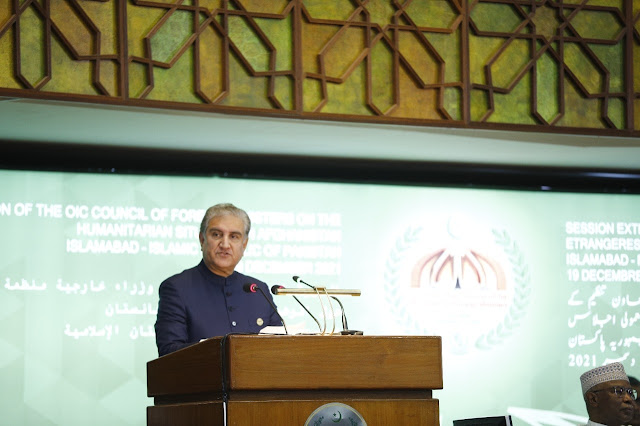I welcome you all to Islamabad for this Extraordinary Session of the OIC Council of Foreign Ministers, on the humanitarian situation in Afghanistan.Let me start by commending the Kingdom of Saudi Arabia – the OIC Summit Chair, for its leadership, in convening this Extraordinary Session.I would like to warmly welcome Secretary General Taha amongst our family. This is his first Foreign ministerial meeting after his appointment as the Secretary General. He and his team also deserve appreciation for their strong support and rapid mobilization of efforts for the Conference arrangements.Pakistan is also gratified by the trust reposed by the OIC Membership in Pakistan to host this Extraordinary Session.Excellencies,Your presence here today - at such short notice - affirms the importance that the international community as a whole, and the OIC, in particular, accord to the well-being of the people of Afghanistan.For the people of Afghanistan, the significance of this gathering goes beyond mere ‘symbolism’; it is a matter of ‘survival’ for them.As we speak, over half the Afghan population – 22.8 million people – a number larger than the entire populations of over two-thirds of the UN member states - face food shortages. Millions of Afghan children are at risk of dying from acute malnutrition.The situation has been brought to this pass by a multiplicity of factors – prolonged drought, years of conflict, poor governance and Afghanistan’s excessive dependence on foreign aid. You would recall that Pakistan hosted the first Extraordinary Session of the OIC Council of Foreign Ministers in Islamabad, in January 1980.Forty-One years on, Pakistan is again obliged to host another Extraordinary Session to discuss the ongoing humanitarian crisis in the same country. It is unfortunate that the hardship and suffering of Afghan people have not abated.The OIC, since the very beginning of Afghan crisis, has stood firmly by the people of Afghanistan. It has consistently supported the right of self-determination and political and economic emancipation of the people of Palestine and of the Kashmiris suffering under illegal occupation. History is our witness that this Organization, even amidst major global political turbulences and crisis, has not only consistently supported the rights of people but also called upon rest of the international community, to act and think beyond their domestic and internal political and economic compulsions.What we face today is no different than what this Organization has witnessed repeatedly. The developments in August 2020, may have altered the political landscape in Afghanistan but they have not made the compelling needs of the Afghan people any less pressing or urgent.The World Food Programme has warned that Afghanistan could become the largest humanitarian crisis in the world. The UN Emergency Relief Coordinator – who we have the pleasure of having with us today – described the Afghanistan situation as in ‘free fall’. These are dire warnings by those with the most intimate and direct knowledge of the grave situation on the ground in Afghanistan. This is a moment to extend a collective helping hand. It is not the time to withhold support. Pakistan concurs with the UN Secretary General that humanitarian support must be provided without conditions. I am confident that I speak for the OIC membership today in reaffirming that this gathering is about the people of Afghanistan. And the only message it wishes to send is one of our unity of purpose and resolve.On its part, Pakistan has demonstrated that its approach towards Afghanistan is guided by the urgent humanitarian concerns. Notwithstanding our state of relations with India, as a special gesture of goodwill towards the Afghan people, Pakistan has decided to allow transportation of 50,000 Metric Tonnes of wheat and lifesaving medicines from India to Afghanistan through the land route.This Organization and the Islamic Ummah as a whole, has come forward to offer its hand of partnership to United Nations, IFIs, and major donors to bring to bear collective expertise in pushing against the unfolding humanitarian crisis in Afghanistan.Let me also express my gratitude to the United Nations, IFIs, regional organizations and other members of the international community for responding positively to my call – again at such a short notice - to sit with us here in Islamabad and look for ways to alleviate the human suffering in Afghanistan.As an immediate neighbor, Pakistan is subject to and is impacted by the growing humanitarian travails of people of Afghanistan. We cannot ignore this reality.As situation stands, we cannot rule out the danger of a complete economic meltdown in Afghanistan. The Afghan economy is likely to witness a contraction of 30% within a year unless this tide is stemmed. Cash is needed to revive the economy – to pay salaries, restore small businesses, reboot the banking system. There is no money available to pay for energy, food, medicines and other essential supplies.The consequences of a major humanitarian crisis and economic collapse in Afghanistan will be horrendous: massive human suffering, mass exodus of Afghan refugees, radicalization, terrorism, and instability, with grave consequences for regional and international peace and security.We must not allow this to happen.For its part, Pakistan is doing all it can to help our Afghan brethren. We have committed $30 million in assistance to Afghanistan. Humanitarian assistance of around 1700 metric ton of relief goods has already been provided. An unprecedented opportunity to consolidate peace beckons. We must not repeat mistakes of the past. Today, we have before us a historic chance to turn the tide. The great poet philosopher of the East, Muhammad Iqbal, characterized Afghanistan as a pivot for peace, stability and prosperity for the entire region. This Extraordinary Session offers us the platform to recommit ourselves to the vision of restoring Afghanistan as the beating ‘Heart of Asia’. We must seize this historic opportunity.
Popular Posts
Labels
Showbiz
3/Showbiz/post-list
Most Recent
3/recent/post-list
Random Posts
3/random/post-list


0 Comments